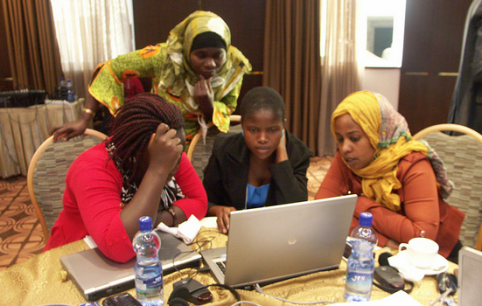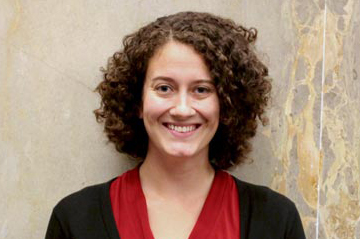February 22 marks Open Data Day, a day that recognizes the importance of transparency and accountability by making information public and accessible. Developers, designers, librarians, statisticians, and citizens will participate in a global network of hackathons that seek to answer one question – what can we do with open data?
For government officials at the forefront of open data and open governance initiatives, this is a question asked daily. From December 11-13, AidData institutional partner Development Gateway co-hosted the Aid Management Platform (AMP) Best Practices Workshop with the Government of Ethiopia in Addis Ababa. The workshop brought together delegations from 13 countries to share best practices and lessons learned from implementing AMP systems to track, manage, and make accessible information on development projects.

Representatives from Malawi, Uganda, Tanzania, and Ethiopia discuss the AMP platform during the workshop.
Although the AMP primarily serves as an internal tool for aid information management, to date 10 countries have opened up their databases of donor-funded development activities to the public. Participating countries include: Burkina Faso, the Democratic Republic of Congo, Haiti, Honduras, Kosovo, Laos, Madagascar, Malawi, Nepal, and Timor-Leste.
Intuitively, launching public portals invites a wide group of stakeholders – donors, universities, think tanks, and advocacy groups – to work alongside the government in order to use aid information to improve development outcomes. Malawi Minister of Finance Maxwell Mkezalamba cited the motivation to “ensure the supply of development data is met with broad-based demand” at the launch of Malawi’s public AMP portal. During the workshop, AMP Administrator Chimvano Thawani discussed how open data in Malawi could improve accountability stating, “if people know that there is a project in their area, and they know the amounts and who is providing the information, they can have the strength to demand accountability from whoever is responsible for managing the project.”
For governments that choose to open their development data to the public, the launch of the AMP platform does not put an end to the open data effort. Launching an open data platform raises a host of challenges. How can we ensure the sustainability of the supply of data? What systems do we need to implement to ensure the reliability and accuracy of the data being published? What trainings are needed to ensure that stakeholders have the capacity to use open data?
The answer to each of these questions is complex, and it almost always requires resources to implement. International Economic Cooperation and Coordination Division Chief and Joint Finance Secretary Madhu Kumar Marasini expressed the challenges faced by his department.
“For us, sustainability is not just about data collection. We also have to continue to maintain the data quality and to do that we need to train our people, line ministries, and donors. We need to train them and to convince them to continue to supply the data, only that will give us sustainability. The other thing we need is resource support, because [sustainability] costs us. We seek our donors’ support to give sustainability to this platform,” Marasini said.
Head of the Division for Planning and Coordination in Kosovo’s Ministry of European Union Integration Fatmir Ramaj expressed a similar concern during the workshop. He suggested that sustainability of the Kosovo AMP platform “needs to be supported financially. We need to spread the knowledge to others so everyone can use it. For this to work, we need to have institutional support.”
Demand for open data can help ensure its continued supply. Dissemination efforts such as outreach and training among line ministries, donors, and citizens will help cultivate demand for open aid information from a population that understands its power and desires the information. This group includes the policymakers who craft government budgets and donor projects. Moreover, building citizen capacity to use open data fosters a political constituency that will demand the provision of development data by the government and hold them accountable if they fail to provide this service.
Thawani left the AMP Workshop with the distinct impression that “the world is now moving towards more transparency.” Thawani and her colleagues at the AMP Workshop are helping to lead this movement, but their efforts depend on the creation of a sustainable open data ecosystem in each of their countries that will enable stakeholders to make open data matter for development.
